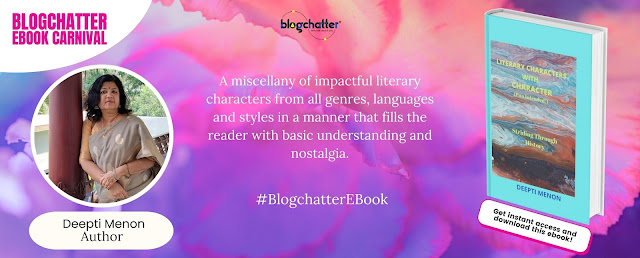Book Review
Deepti Menon’s e-book, Literary
Characters with Character, presents 26 illustrious characters from literature.
This book is a compilation of what the author wrote for the A-to-Z Challenge of
Blogchatter and hence a few
characters may be here by the sheer practical demand of the alphabet. The witches
in Macbeth, for example, who take the place of the letter W under the title ‘The
Weird Sisters’. [‘Witches’ would have been as good a title, I guess.] But it
must be added hastily that the author has made a judicious selection of
characters notwithstanding the alphabetic diktat. From Atticus Finch of Harper
Lee’s unforgettable classic, To Kill a Mockingbird, to Dr Zhivago of an
even greater classic, we have a treasure house of illustrious characters here.
The paramount
service this book does is to remind you of certain characters you shouldn’t
forget. Those who know these characters will, hence, find this book a
refreshing whiff of some sweet past. Those who are not so familiar with
classical literature will find this book a gentle invitation to a big world
that lies beyond the horizons of mediocre imagination. Not that these characters
are sweet or gentle. Characters that leave deep marks on your soul can never be
sweet or gentle. But your souls will be sweet and gentle if you have internalised
the essential lessons from these characters. This is why Deepti Menon’s book
becomes a guiding star in the engulfing darkness.
The author presents
not only the characters but also quite a bit of trivia associated with them
like the movies made about them and the actors who played them. This can make
the book appealing to the younger generation, I believe.
I got to know
some interesting facts from this book. For example, Oscar Wilde’s Dorian Gray was
not much of a success in the beginning. “It was after Wilde’s death in 1900
that the book began to attract attention and acclaim and was adapted to the
stage as well as the film world,” writes Deepti. She continues to inform us
that “The most popular film adaptation came in 1945, where Angela Lansbury won
a Best Supporting Actress nomination…”
Wilde is of a
personal interest to me simply because I have always loved his bohemianism. And
Deepti enlightens me with a quote like: “(The Picture of Dorian Gray) contains
much of me (Oscar Wilde) in it. Basil Hallward is what I think I am; Lord
Henry, what the world thinks me; Dorian is what I would like to be.” Having
struggled with quite a few inner demons, I know what Wilde went through. Thanks
to Deepti for that whiff of the soul’s pangs.
Occasionally
this book gives us some quotes too. I particularly love the one-liners from
Tyrion Lannister. “A mind needs books like a sword needs a whetstone.” I’m
going to use this one in my speech on Monday to a group of 2300 students on the
occasion of the Reading Day. Here’s another from Deepti’s book: “Once you have
accepted your flaws, no one can use them against you.” And the best one: “People
often hunger for truth but seldom like the taste when it is served up.”
So, welcome
friend, to meet a wide range of charming characters including the fiery Kannagi
of the Tamil classic Silappatikaram and Wodehouse’s lovably bungling
Bertie Wooster.
My complaint
about this book, however, is that the author could have gone a little deeper into
the psyche of these complex characters. They have a lot more to offer than what
we find in this book. That is why this book stops short of being the
entertainment and becomes an usherer.
PS. Deepti
Menon’s book is available for free download here.
My own e-book (free to download)
in the same series as the above one is Humpty
Dumpty’s 10 Hats and the first review of it (as far as I know) is here.
Let me steal an extract from the review and put here:
The 10 short stories transported me into
a different world than my home, through its narration. It elicited a rainbow of
emotions, feelings of fear, smile, laughter, awe, affection, love and more.
While this was for the words that one reads, each story has layers to them
highlighting the societal hypocrisy, duality, reality in each of the events
that unfold. The people in the short stories feel like they were one among us,
our family, friends, neighbours, conmen, godmen, and leaders whom we might
know, and probably also met in our real life, who think like us, and sometimes
we might probably also see a reflection of ourselves in one or more of the
characters from these stories. Some we might accept while some we might be
against. It was pleasure to read names that I have been used to hearing from my
everyday life, experience the beauty (and eeriness of) locations that I have
visited with family and friends during my school excursions and family
vacations, all over again.

Hari OM
ReplyDeleteI have enjoyed Deepti's posts from time to time so can quite imagine the style of this book - your review does provide enough for me to think it worth spending time with... and although I too like the sort of depth you say may be lacking, perhaps that would not be appropriate in such a book? Surely the original authors are the only ones who could have ascribed more of that pscyhe to their characters? And, ultimately, only the reader can draw the character presented to them and each of us will add our own 'colour' to that person; much as we do in real life. YAM xx
It's possible that Deepti wished to keep the sketches simple. After all, blog posts do have certain limits and limitations.
Delete